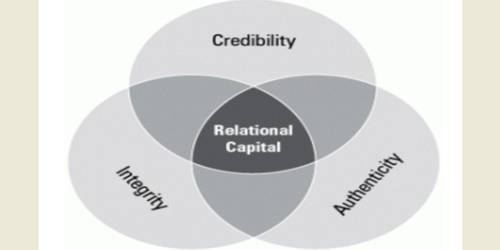Relational capital is a type of intangible asset established by a business based on its reputation and relationships with stakeholders. It is one of the three primary components of intellectual capital and is the value inherent in a company’s relationships with its customers, vendors, and other important constituencies. It includes the set of economic, political, and institutional relations developed and maintained between the organization and non-academic partners. It also includes knowledge, capabilities, procedures, and systems that are developed from relationships with external agents.
The following are common elements of relational capital –
- Brands: Brands can be extremely valuable as customers tend to choose products and services that they recognize and trust.
- Employer Branding: A firm’s reputation and identity as an employer.
- Stakeholders: Relationships and reputation amongst stakeholders such as investors, communities, and governments.
- Customer Relationships: Customer relationships such as a pool of customers who pay monthly recurring fees that have high switching costs.
- Partners: Connections and relationships such as a research partnership with a university or distribution partnership with a retailer.
- Contacts: Formal relationships outlined in contracts such as a licensing agreement for a brand.
Relational capital is embedded in the relationships that a library creates with its external environments, such as to providers, customers, potential customers, other libraries or organizations, and investors, in order to create value. Relational dependency may be vertical or horizontal, either up or downstream, shaping different types of cooperative, collaborative or competitive mechanisms in a different ecosystem. It is a category of Intellectual Capital or Intangible Assets that is created and maintained by having, nurturing and managing good relationships with clients, suppliers, employees, governments, other stakeholders and even competitors. It functions very differently from the other five capitals so this is not surprising.
There are major conceptual differences between industrial and regional economists in their views towards relational capital. There have been researching studies applying quantitative, empirical, and econometric techniques in an effort to verify the existence of relational capital and its importance to the innovation activity in firms. Proxies are found to represent the channels through which knowledge develops at the local level and therefore indirectly of relational capital.
Relational capital is a significant element of the International <IR> Framework but companies are only just learning to think fluently about it. The main aims of the paper are twofold. The first is to underline the major conceptual differences between industrial and regional economists. The second is to provide a quantitative empirical approach, using econometric techniques, to verify the existence and importance of relational capital on the innovation activity of firms. Proxies are found to represent the channels through which local knowledge develops at the local level and therefore indirectly of relational capital. It is indeed reasonable to expect that relational capital will play a different role in different regional, sectoral and firm’s contexts. It is, therefore, possible to identify a valid business case for assessing and improving business relationships.
















